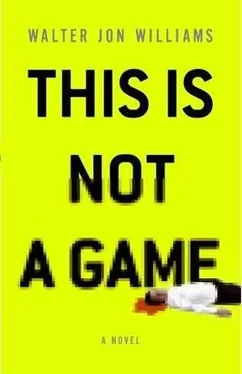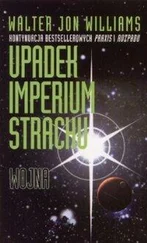Dagmar loved it so much she was tempted to give it a name but never had.
She stepped out of the terminal, and tropical heat slapped her in the face. Mist rose in little wisps from the wet pavement, and the air smelled of diesel exhaust and clove cigarettes. Dagmar saw the Sheraton and the Aspac glowing on the horizon, found their numbers online, and called. They were full. She googled a list of Jakarta hotels, found a five-star place called the Royal Jakarta, and booked a room at a not-quite-extortionate rate.
Dagmar found a row of blue taxis and approached the first. The driver had a lined face, a bristly little mustache, and a black pitji cap on his head. He turned down his radio and gave her a skeptical look.
“I have no rupiah,” she said. “Can you take dollars?”
A smile flashed, revealing brown, irregular teeth.
“I take dollar!” he said brightly.
“Twenty dollars,” she said, “to take me to the Royal Jakarta.”
“Twenty dollar, okay!” His level of cheerfulness increased by an order of magnitude. He jumped out of the cab, loaded her luggage into the trunk, and opened the door for her.
Above the windshield were pictures of movie stars and pop singers. The driver hopped back in the car, lit a cigarette, and pulled into traffic. He didn’t turn on the meter, but he turned up the radio, and the cab boomed with the sound of Javanese rap music. He looked at Dagmar in the rearview mirror and gave a craggy-toothed smile.
Then the terror began.
None of the drivers paid any attention to lanes. Sometimes the taxi was one of five cars charging in line abreast down a two-lane road. Or it would weave out into oncoming traffic, accelerating toward a wall of oncoming metal until it darted into relative safety at the last possible instant.
Automobiles shared the roadway with trucks, with buses, with vans and minibuses, with bicycles, with motorbikes, and with other motorbikes converted to cabs, with little metal shelters built on the back. All moved at the same time or were piled up in vast traffic jams where nothing moved except for the little motorbikes weaving between the stalled vehicles. Occasional fierce rain squalls hammered the window glass. The driver rarely bothered to turn on the wipers.
What Dagmar could see of the driver’s face was expressionless, even as he punched the accelerator to race toward the steel wall of a huge diesel-spewing Volvo semitruck speeding toward them. Occasionally, whatever seeds or spices were in the driver’s cigarette would pop or crackle or explode, sending out little puffs of ash. When this happened, the driver brushed the ashes off his chest before they set his shirt on fire.
Dagmar was speechless with fear. Her fingers clutched the door’s armrest. Her legs ached with the tension of stomping an imaginary brake pedal. When the traffic all stopped dead, which it did frequently, she could hear her heart hammering louder than the Javanese rap.
Then the cab darted out of traffic and beneath a hotel portico, and a huge, gray-bearded Sikh doorman in a turban and an elaborate brocade-spangled coat stepped forward to open her door.
“Welcome, miss,” he said.
She paid the driver and tipped him a couple of bucks from her stash of dollars, then stepped into the air-conditioned lobby. Her sweat-soaked shirt clung to her back. She checked into the hotel and was pleased to discover that her room had Western plumbing, a bidet, and a minibar. She showered, changed into clothes that didn’t smell of terror, and then went to the hotel restaurant and had bami goreng along with a Biltong beer.
There was a string quartet playing Haydn in a lounge area off the hotel lobby, and she settled into a seat to listen and drink a cup of coffee. American hotels, she thought, could do with more string quartets.
A plasma screen was perched high in the corner, its sound off, and she glanced up at CNN and read the English headlines scrolling across the bottom of the screen.
Indonesian crisis, she read. Government blamed for currency collapse.
She could taste a metallic warning on her tongue.
All cancel, she thought.
Dagmar had been in Bengaluru for a wedding, but not a real wedding, because the bride and groom and the other principals were actors. The wedding was the climax of a worldwide interactive media event that had occupied Dagmar for six months, and tens of thousands of participants for the past eight weeks.
Unlike the wedding, Bengaluru was real. The white-painted elephant on which the groom had arrived was real. The Sikh guards looking after the bride’s borrowed jewelry were real.
And so were the eighteen-hundred-odd gamers who had shown up for the event.
Dagmar’s job was to create online games for a worldwide audience. Not games for the PC or the Xbox that gamers played at home, and not the kind of games where online players entered a fantasy world in order to have adventures, then left that world and went about their lives.
Dagmar’s games weren’t entertainments from which the players could so easily walk away. The games pursued you. If you joined one of Dagmar’s games, you’d start getting urgent phone calls from fictional characters. Coded messages would appear in your in-box. Criminals or aliens or members of the Resistance might ask you to conceal a package. Sometimes you’d be sent away from your computer to carry out a mission in the world of reality, to meet with other gamers and solve puzzles that would alter the fate of the world.
The type of games that Dagmar produced were called alternate reality games, or ARGs. They showed the players a shadow world lurking somehow behind the real one, a world where the engines of existence were powered by plots and conspiracies, codes and passwords and secret errands.
Dagmar’s job description reflected the byzantine nature of the games. Her business card said “Executive Producer,” but what the players called her was puppetmaster.
The game that climaxed in Bengaluru was called Curse of the Golden Nagi and was created for the sole purpose of publicizing the Chandra Mobile Communications Platform, a fancy cell phone of Indian manufacture that was just breaking into the world market. Live events, where gamers met to solve puzzles and perform tasks, had taken place in North America, in Europe, and in Asia, and all had climaxed with the fictional bride and the fictional groom, having survived conspiracy and assassination attempts, being married beneath a canopy stretched out in the green, flower-strewn courtyard of one of Bengaluru’s five-star hotels and being sent to their happily-ever-after.
Dagmar’s own happily-ever-after, though, had developed a hitch.
The hotel room was good. Dagmar spent a lot of time in hotel rooms and this was at the top of its class. Air-conditioning, exemplary plumbing, a comfortable mattress, a complimentary bath-robe, Internet access, and a minibar.
The rupiah had collapsed, but Dagmar had $180 in cash, credit cards, a bank card, and a ticket out of town. Indonesia was probably going to go through a terrible time, but Dagmar seemed insulated from all that.
She’d passed through too many time zones in the past four days, and her body clock was hopelessly out of sync. She was either asleep or very awake, and right now she was very awake, so she propped herself with pillows atop her bed, made herself a gin and tonic with supplies from the minibar, and called Charlie, her boss. It was Monday morning in the U.S.-in fact it was yesterday, on the other side of the date line, and Charlie was going through a day that, to Dagmar, had already passed its sell-by date.
“How is Bangalore?” he asked.
“I’m not in Bangalore,” she told him. “I’m in Jakarta. I’m on my way to Bali.”
It took a couple of seconds for Charlie’s surprise to bounce up to a satellite and then down to Southeast Asia.
Читать дальше











